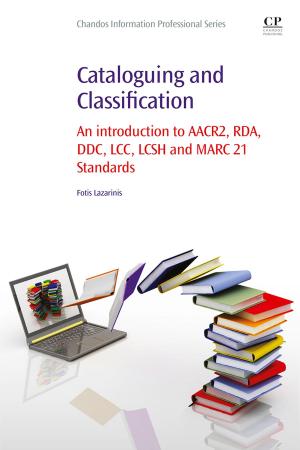Introduction to Robust Estimation and Hypothesis Testing
Nonfiction, Science & Nature, Mathematics, Statistics| Author: | Rand R. Wilcox | ISBN: | 9780128047811 |
| Publisher: | Elsevier Science | Publication: | September 2, 2016 |
| Imprint: | Academic Press | Language: | English |
| Author: | Rand R. Wilcox |
| ISBN: | 9780128047811 |
| Publisher: | Elsevier Science |
| Publication: | September 2, 2016 |
| Imprint: | Academic Press |
| Language: | English |
Introduction to Robust Estimating and Hypothesis Testing, 4th Editon, is a ‘how-to’ on the application of robust methods using available software. Modern robust methods provide improved techniques for dealing with outliers, skewed distribution curvature and heteroscedasticity that can provide substantial gains in power as well as a deeper, more accurate and more nuanced understanding of data. Since the last edition, there have been numerous advances and improvements. They include new techniques for comparing groups and measuring effect size as well as new methods for comparing quantiles. Many new regression methods have been added that include both parametric and nonparametric techniques. The methods related to ANCOVA have been expanded considerably. New perspectives related to discrete distributions with a relatively small sample space are described as well as new results relevant to the shift function. The practical importance of these methods is illustrated using data from real world studies. The R package written for this book now contains over 1200 functions.
New to this edition
-
35% revised content
-
Covers many new and improved R functions
-
New techniques that deal with a wide range of situations
-
Extensive revisions to cover the latest developments in robust regression
-
Covers latest improvements in ANOVA
-
Includes newest rank-based methods
-
Describes and illustrated easy to use software
Introduction to Robust Estimating and Hypothesis Testing, 4th Editon, is a ‘how-to’ on the application of robust methods using available software. Modern robust methods provide improved techniques for dealing with outliers, skewed distribution curvature and heteroscedasticity that can provide substantial gains in power as well as a deeper, more accurate and more nuanced understanding of data. Since the last edition, there have been numerous advances and improvements. They include new techniques for comparing groups and measuring effect size as well as new methods for comparing quantiles. Many new regression methods have been added that include both parametric and nonparametric techniques. The methods related to ANCOVA have been expanded considerably. New perspectives related to discrete distributions with a relatively small sample space are described as well as new results relevant to the shift function. The practical importance of these methods is illustrated using data from real world studies. The R package written for this book now contains over 1200 functions.
New to this edition
-
35% revised content
-
Covers many new and improved R functions
-
New techniques that deal with a wide range of situations
-
Extensive revisions to cover the latest developments in robust regression
-
Covers latest improvements in ANOVA
-
Includes newest rank-based methods
-
Describes and illustrated easy to use software















